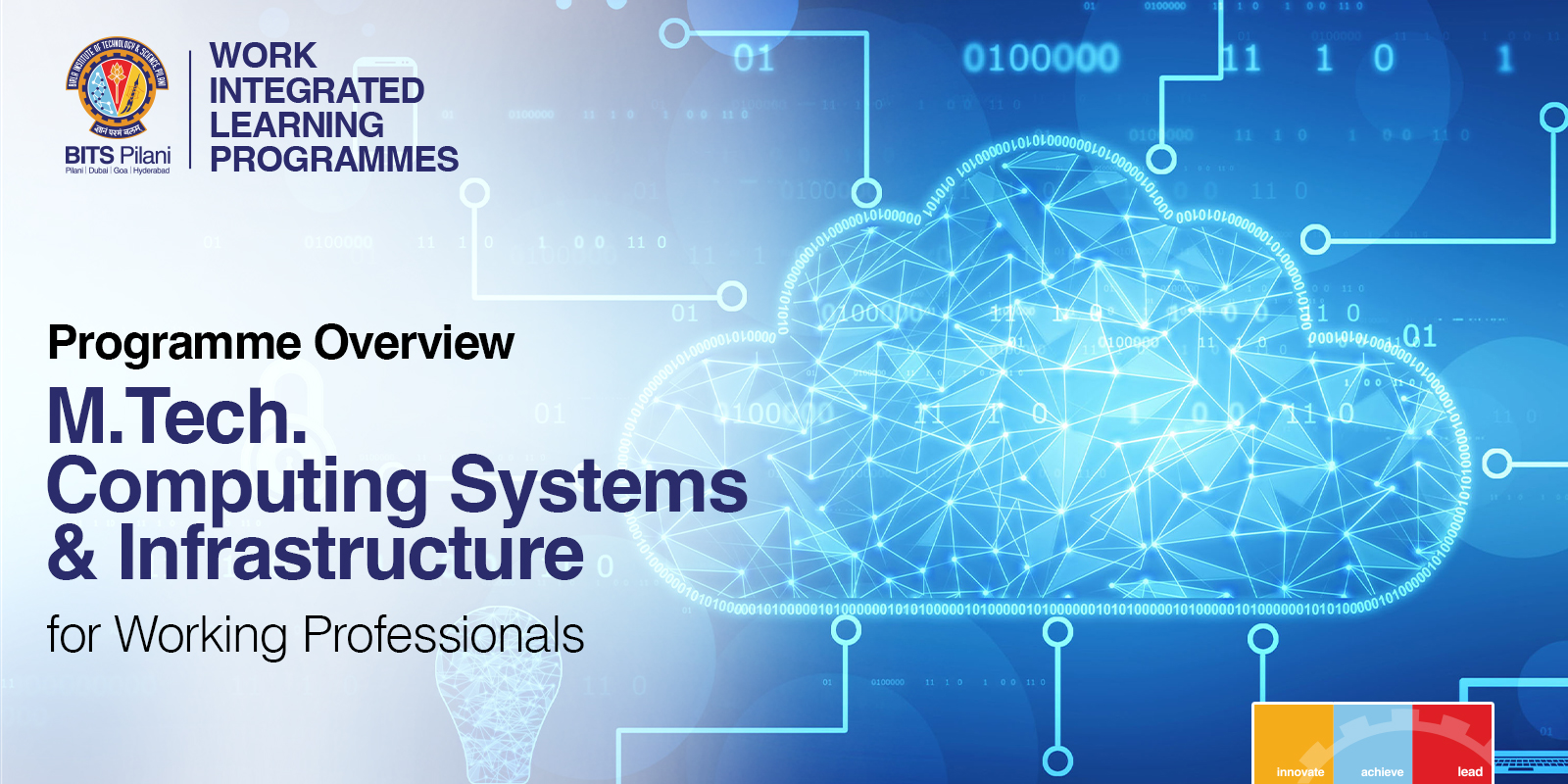Build the tech infra of the future
According to Gartner, the worldwide public cloud services market is expected to grow from $182b in 2018, to about $331b in 2022. The Indian market will grow at a CAGR of 33.9% between 2017-22, to reach $6.3b by 2022. Owing to this, technology professionals with skills in domains such as DevOps, SaaS, IaaS, Automation, Agile and software-defined networks are going be in high demand.
M.Tech. Computing Systems is a four-semester Work Integrated Learning Programme designed to help technology professionals build skills required to remain competitive in the rapidly evolving workplace, and enable rapid career progression in the area of IT Infrastructure Operations and Management.
Programme Highlights
- Industry-relevant curriculum, delivered online or on-site lectures.
- The programme offers a set of courses that allow learners to gain expertise in designing and managing hardware, software, storage & networking systems, and Infrastructure Services management.
- The programme makes use of Simulation Software, and Deployment Environments. These include CloudSim, NS2, Net-SNMP, CPU-OS Simulator, Amazon’s Compute and Storage platforms, Apache cloud suite, and other open-source tools/frameworks.
- The Dissertation (Project Work) in the final semester enables students to apply concepts and techniques learnt during the programme.
- The programme uses a Continuous Evaluation System that assesses the learners over convenient and regular intervals. Such a system provides timely and frequent feedback and helps busy working professionals stay on course with the programme.
- The education delivery methodology is a blend of classroom and experiential learning. Experiential learning consists of lab exercises, assignments, case studies and work-integrated activities.
- Participants who successfully complete the programme will become members of an elite & global community of BITS Pilani Alumni.
Programme Curriculum
Participants need to take at least 12 courses towards coursework, and complete one Project/ Dissertation. The coursework requirement for the programme would consist of a set of core courses and electives. Core courses are compulsory for all participants, while electives can be chosen based on individual learning preferences.
The programme offers a degree of customisation to address the specific L&D needs of your organisations.
- Network Security
- Cloud Computing
- Elective 1
- Elective 2
- Design and Operation of Data Centers
- Advanced Computer Networks
- Elective 3
- Elective 4
- Middleware Technologies
- Infrastructure Management
- Elective 5
- Elective 6
Dissertation
- Cryptography
- Cyber-Physical Systems
- Data Warehousing
- Introduction to DevOps
- Network Programming
- Networked Embedded Applications
- Service-Oriented Computing
- Software Development for Portable Devices
- Telecom Network Management
- Web Technologies
- Wireless & Mobile Communication
- Data Storage Technologies & Networks
- IT Infrastructure Projects & Process
- Introduction to Data science
- Database Design and Applications
Learning Methodology
LECTURES DELIVERED ONLINE AND ONSITE
Lectures are delivered by BITS Pilani faculty members through live via online classes, or at the organisation's premises, and are designed to offer similar levels of interactivity as regular classrooms at the BITS Pilani campus.
DIGITAL LEARNING
Learners can access engaging learning material which includes recorded lectures from BITS Pilani faculty members, course handouts and recorded lab content where applicable.
CONTINUOUS ASSESSMENT
Continuous Assessment includes graded Assignments/ Quizzes, Mid-semester exam, and Comprehensive Exam.
EXPERIENTIAL LEARNING
The programme emphasises on Experiential Learning that allows learners to apply concepts learnt in the classroom in simulated, and real work situations. This is achieved through:
- Simulation Tools, & Environments: Some or all of the following would be utilised across the programme.
- Simulation Software like CloudSim, NS2, Net-SNMP, CPU-OS Simulator.
- Deployment Environments including Amazon’s Compute and Storage platforms, Apache cloud suite, and other open-source tools/frameworks.
CASE STUDIES AND ASSIGNMENTS
Carefully chosen real-world cases & assignments are both discussed and used as problem-solving exercises during the programme.
DISSERTATION/ PROJECT WORK
The fourth semester offers an opportunity for learners to apply their knowledge gained during the programme to a real-world like complex project. The learner is expected to demonstrate understanding of vital principles learnt across semesters and their ability to successfully apply these concepts.
Eligibility Criteria
Minimum eligibility to apply: Employed professionals holding B.Tech./ BE/ M.Sc./ MCA or equivalent in relevant disciplines with at least 60% aggregate marks and minimum one year of work experience after the completion of the degree in relevant domains.
The programme is designed for highly driven and ambitious engineers and managers who work in areas such as Infrastructure Management, Data Center Operations, Cloud Deployment, and Networked Embedded Systems.
If you are an IT professional in a technical role such as DevOps Engineer, Systems Engineer, Network Administrators, Cloud Services Engineer or techno-managerial roles such as Infrastructure Lead/ Infrastructure Manager, you should consider applying to this programme.


.png)
.png)
.png)
.png)
.png)
.png)
.png)
.png)